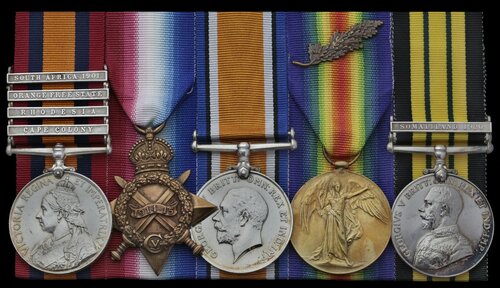
Auction: 22001 - Orders, Decorations and Medals
Lot: 184
The rare 'Somaliland 1920' campaign group of five awarded to Surgeon Captain E. Cameron, Royal Navy, late Imperial Yeomanry, who was commended and 'mentioned' on numerous occasions for his fine work
Queen’s South Africa 1899-1902, 4 clasps, Cape Colony, Rhodesia, Orange Free State, South Africa 1901 (12569 Tpr: E. Cameron. 70th Coy. 18th Imp. Yeo.); 1914-15 Star (St. Surg. E. Cameron, M.B., R.N.); British War and Victory Medals, with M.I.D. oakleaves (Surg. Lt. Cr. E. Cameron. R.N.); Africa General Service 1902-56, 1 clasp, Somaliland 1920 (Surg. E. Cameron.), mounted for display, good very fine and better (5)
Ewen Cameron was born in 1878 at Epworth, Lincolnshire. His father is not recorded at home in the 1881 census but his mother is shown as 'Doctor's wife'.
Young Cameron entered Edinburgh Medical School in 1895 and graduated in 1902. His studies were interrupted as in February 1900 he joined the Imperial Yeomanry and served in South Africa until June 1901 (Medal & 4 clasps).
In February 1906 he joined the Royal Navy as Surgeon. His promotions were to Staff Surgeon in February 1914, Surgeon Lieutenant-Commander in March 1918 and to Surgeon Captain on retirement in May 1928.
After appointments on Vivid, Skipjack, Caernarvon, Terrible, President, Vernon and Gibraltar he joined Espiegle in December 1912 and was to serve on her until May 1916.
In 1913 he had requested a transfer to the Colonial Service in Somaliland and later that year he was commended for his handling of the Camel Corps after the disaster at Burao - for which he earned the N.G.S. with clasp 'Persian Gulf 1910-14'. His Medal was lost when the P&O liner Persia was sunk on 18 December 1915, no record of a replacement ever being issued.
The Espiegle was soon into the action of the Great War:
'By September 1914, it had become clear that Turkey was preparing for war, and it was only a matter of time before she entered the conflict on Germany's side. In anticipation, three Royal Navy vessels, the Odin, Espiegle and Dalhousie entered the Shatt-al-Arab in order to protect the Abadan Island oil refineries. Soon thereafter, on October 7th, a formal letter from the Turkish Government was delivered to the Espiegle essentially stating that the RN ships were violating Turkish sovereignty and that they must depart from the Shatt-al-Arab within 24 hours. The British however, were unwilling to leave their interests defenseless, and in any event, since one bank of the Shatt belonged to Persia, Turkey's control over it was not absolute. Throughout the rest of October, the Turks and the Royal Navy sat in an uneasy peace, with both sides hurriedly preparing for the war they knew was coming. On October 31st, the Commander of the Espiegle learnt through a telegram that the Turkish Navy had bombarded the Russian port of Odessa in the Black Sea on October 28th, thus effectively declaring war. On November 5th, Great Britain officially declared war on the Ottoman Empire. The very next day, the Espiegle engaged and silenced a significant body of Turks who had constructed a series of trenches opposite Abadan Island in a hotly contested affair. The war in Mesopotamia had begun.'
In May 1915 Cameron was again commended for his work during and after the Battle of Shaiba and was awarded a 'mention' (London Gazette 17 October 1916, refers). This seems to be covered by two recommendations, one with several Naval Officers for actions in November and December 1917 and the second for service at the British General Hospital Basra for his work after the action at Saiba. In August 1920 it was noted that Cameron had been recommended for a decoration for his work in Mesopotamia but no action could be taken as the final list had been presented.
In August 1918 he was lent to the Colonial Office for a term of three years. His trip to Somaliland was not uneventfulf or he was travelling on the Tasman which was sunk on 16 September 1918.
Having served during the campaign of 1920, with Sick Berth Petty Officer Hulme at his side - Cameron was again 'mentioned' for his part in the operations (London Gazette 29 November 1920, refers).
Suffering dysentery and malaria Cameron went on sick leave until 1922. His final appointment was aboard Carysfoot. In 1940 he was working in the Public Health Department in Stafford. Cameron died in May 1952 at Petersfield, Hampshire.
For the Medals of Sick Berth Petty Officer Hulme, please see Lot 223.
Subject to 20% VAT on Buyer’s Premium. For more information please view Terms and Conditions for Buyers.
Sold for
£4,200
Starting price
£700




